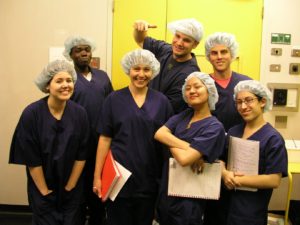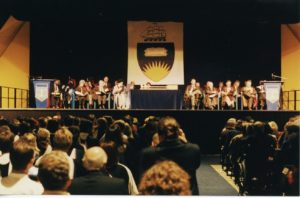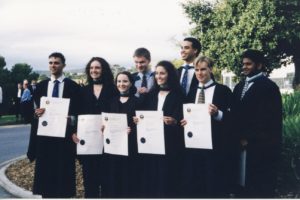

Flinders University are proud to celebrate 25 years of teaching Biomedical Engineering and 20 years of graduates.
As the first University in Australia to offer an accredited biomedical engineering undergraduate degree, Flinders has been a long leader in the field. Since taking its inaugural degree students in 1993, the Biomedical Engineering teaching team at Flinders University have striven to best equip each graduate for her or his professional working life. A significant milestone in Australian engineering history, the course brings together two disciplines – medicine and engineering – to positively influence human health and well-being.
1997 saw the graduation of the initial cohort of ten undergraduate biomedical engineers. Since that time almost 250 students have graduated biomedical engineering at Flinders University with either undergraduate, graduate certificate, diploma, masters or PhD level.
Flinders University Biomedical Engineering graduates have a long history of success, winning numerous awards including:
- IEE Australia Technical Presentation Prize national award (now IET ‘Present around the World’ competition). Despite only representing a very small percentage of South Australian undergraduate engineers, Flinders University Biomedical Engineering students have won the state level prize 11 times in the past 20 years – a significant achievement.
- National Fresh Science Award (Sherry Randhawa, 1999), British Council national Fresh Science Award (Olivia Lockwood (nee Pallotta) 2002); Tim Nelson, 2005)
- IEAust (now Engineers Australia) “Young Biomedical Engineer” national award (Olivia Lockwood (nee Pallotta), 2001)
- Churchill Fellowship, (David Hobbs, 2002; Courtney Ryder, 2013), Fulbright Professional Scholarship (David Hobbs, 2008), Menzies Scholarship to undertake doctorate at Oxford University (Alisa Selimovic, 2009), Sir General John Monash Scholar (Laura Diment, 2015)
- Engineers Australia’s Australian Young Professional Engineer of the Year (David Hobbs; 2004)
- Australian Museum Eureka Prize for Inspiring Science (Puya (Peter) Abolfathi, 2004)
- South Australian Young Professional Engineer of the Year – Engineers Australia (Luke Errington, 2005)
- IET Local Network Outstanding Female Student in Engineering – (Diana Pham, 2006; Alisa Selimovic 2007; Madeleine Yates, 2007 and 2009)
- ABC TV’s “New Inventors” People Choice and Les is More Awards (Toan Nguyen 2006)
- National AusBiotech-GSK Student Excellence Award (Tony Carlisle, 2009)
- National Engineers Without Borders Challenge (Laura Bell, 2009; Vy Nguyen 2010)
“As Chancellor of Flinders University for eight years until February 2010 I am able to say that the Flinders Biomedical Engineering programs are playing a pivotal role in shaping the next generation of biomedical engineers in Australia. The highly supportive educational environment provided by the academic team inspires and motivates the students, and they gradate ‘industry ready’ with the skills required to collaborate effectively with experts from other discipline areas, apply creativity and engineering skills to a wide variety of problems, and to drive the processes required for solution.” The Honourable Sir Eric Neal AC CVO FTSE (Quote from 2012 celebration)
It’s 20-week Work Integrated Learning (WIL) program has become an exemplar for other programs across the country. Students have travelled around the globe on student placements including Sweden, Canada, the UK, Germany, Singapore, Switzerland and the USA, representing Flinders University with pride.
As part of the WIL program, undergraduate engineering students spend 5 months working in industry. This allows them to immersive themselves within the organisation or company, and make a substantial contribution to their WIL provider through a long-term technical project. If you have a project suitable for a current WIL engineering student, please contact david.hobbs@flinders.edu.au today.
In addition to strong teaching leadership, Flinders University has built a strong research capability in biomedical engineering, home to the multi-disciplinary Medical Device Research Institute (MDRI) which has the expertise and capabilities to deliver innovative solutions to the medical and allied health sectors. Over the past five years, the MDRI has attracted two new Strategic Professorial appointments with Professor Mark Taylor and Professor John Arkwright.
Flinders MDRI is also home to the award-winning Medical Device Partnering Program, a unique industry engagement program which fosters collaboration between inventors, researchers, industry and end-users in the development of novel medical devices and assistive technologies.


Some highlights over past 25 years.
January 1992 – Andrew Downing appointed to Flinders University – Head of Engineering 1992-2007.
1993 – First intake of undergraduate Biomedical Engineering degree students commence at Flinders University
1996 – Nine students graduate with a Diploma of Biomedical Engineering
1997 – First postgraduate students graduate with Master of Biomedical Engineering (Research)
1997 – First cohort of undergraduates complete their degree in Bachelor of Science, Bachelor of Engineering (Biomedical) at Flinders University
1999 – First PhD in Biomedical Engineering awarded at Flinders University
2005 – Australia’s first Indigenous student to complete Biomedical Engineering degree
2005 – Flinders Medical Devices and Technologies (FMDAT) designated an Area of Strategic Research Investment for the University.
2008 – Official Launch of the Medical Device Partnering Program by The Hon. John Hill MP.
2009 – Flinders Foundation Professor of Engineering, Andrew Downing awarded the Engineers Australia David Dewhurst Award in recognition for his outstanding contribution to the profession of biomedical engineering
2009 – Engineering Building at Flinders University officially named Sir Eric Neal Building, in recognition of the contributions of The Honourable Sir Eric Neal AC, CVO FTSE to the University, in particular for his support and encouragement of engineering at Flinders University.
2010 – Medical Device Partnering Program (MDPP) wins the Technology Industry Association’s Service to the Electronics and ICT Industry award
2010 – Professor of Biomedical Engineering Karen Reynolds named Australian Professional Engineer of the Year
2011 – Flinders Biomedical Engineering team win Australian Learning and Teaching Council (ALTC) Citation ‘for teaching supporting and inspiring students to learn, innovate and succeed as professional biomedical engineers’.
2011 – Flinders’ new million dollar Six Degree of Freedom Hexapod Robot launched
2011 – Professor Karen Reynolds elected as Fellow of the Australian Academy of Technological Sciences and Engineering
2011 – The MDPP wins the Business/Higher Education Round Table national award for “Best Research and Development Collaboration”.
2011 – Flinders Foundation Professor of Engineering, Andrew Downing, awarded the Peter Nicol Russell Memorial Medal, Engineers Australia’s most prestigious award, for notable contributions to the science or practice of engineering in Australia.
2012 – Official launch of the Medical Device Research Institute (MDRI).
2012 – Flinders Biomedical Engineering Professor Karen Reynolds named among Australia’s 100 most influential engineers by Engineers Australia
2012 – Four MDRI members named finalists in the SA Science Excellence Awards
2012 – Flinders Professor of Biomedical Engineering Karen Reynolds awarded South Australian Scientist of the Year
2012 – Flinders research win both first place at the ARATA Soft Technology Awards and the Tertiary Student Project prize at the iAwards for games aimed at improving access to technologies for young people with disabilities.
2012 – Six Degree of Freedom Hexapod Robot wins SA Engineering Excellence Award for “Innovation/Research and Development” and the prestigious “Malcolm Kinnaird Engineering Excellence Award’
2015 – Biomedical Engineering moves into Flinders University’s state-of-the-art $120 million building at the new Tonsley precinct.

